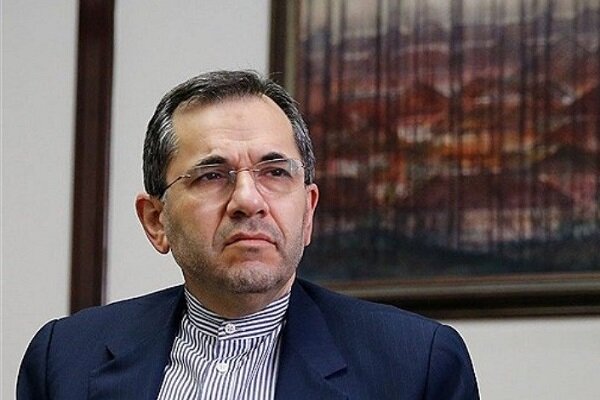In continuation of his hostile anti-Iran policies, US President Donald Trump signed an executive order on Monday, imposing new sanctions against the office of Leader of the Islamic Revolution Ayatollah Seyyed Ali Khamenei, Iran's foreign minister, and senior commanders of the Islamic Revolutionary Guards Corps (IRGC), in response to Tehran's downing of an American drone last week that had violated the country's airspace.
“The US’s decision today to impose more sanctions against Iran is another indication that America does not attach any respect to the international laws and the prevailing international opinion,” Iran's envoy to the United Nations, Majid Takht-e Ravanchi told the press on the sidelines of a closed-door UN Security Council meeting on Iran on Monday.
The Iranian envoy was not allowed to take part in the meeting.
The United States must stop "its economic warfare and terrorism against the Iranian people," he asserted.
He also protested at the UN Security Council's keeping the country out of the underway closed-door meeting called by the US to address Iranian forces’ recent downing of an intruding American drone.
“As a country, whose airspace has been violated…, Iran had a right to be present at the meeting,” he said, pointing to the right as Iran’s entitlement under the UN Charter.
The IRGC shot down the American spy drone over the southern Iranian province of Hormozgan on Thursday. The aircraft had ignored the Corps’ repeated warnings.
“Today, the Security Council was briefed unilaterally by the United States [on the incident],” the Iranian official said.
He blamed the US for shutting Iran out of the session by misusing its position as a permanent Council member to “mislead Council members in order to further its age-old anti-Iranian policy.”
The Iranian diplomat also reminded that the Council had been provided with “undeniable information” regarding the incident, which showed the aircraft’s exact course and point of entry. Iran’s move to bring down the drone fitted perfectly within the international legal norms and was consistent with the UN Charter’s Article 51, he added.
The US has trespassed on Iran’s skies on numerous occasions, Takht-e Ravanchi reminded, and recalled that the Islamic Republic’s forces had shown “maximum restraint” by sparing a manned American aircraft, which was simultaneously encroaching on the Iranian airspace.
“These are just a number of instances of the US’s provocative and adventurist measures in intruding into Iran’s borders and airspace,” he stated.
He urged that Washington put an end to the adventurism, and reiterated Tehran’s assertion that “we are neither after war, nor want tensions in the Persian Gulf region to increase.”
Takht-e Ravanchi added that, however, both inside and outside the region, a certain “circle” is trying to up the tension through dangerous behavior to justify regional militarism and arms sales.
Those would resort to “deceit and misinformation” to further their ambitions, he added, citing the example of the US’s allegations trying to pin recent attacks on two oil tankers, one Japanese and another Norwegian-owned, in the Sea of Oman on Iran.
Those allegations were spurned even by some of the US’s close allies, Takht-e Ravanchi said.
“How can Iran possibly benefit from an attack on a tanker heading for Japan at a time when the country’s prime minister [Premier Shinzo] is meeting with the topmost Iranian official [Ayatollah Khamenei] during a historical visit?”
“There is no funnier allegation” than the one implicating Iran, the official said.
He finally cited the need for genuine dialogue on regional security, asking UN Secretary-General Antonio Guterres to play a role.
MNA/IRN83368450

























Your Comment